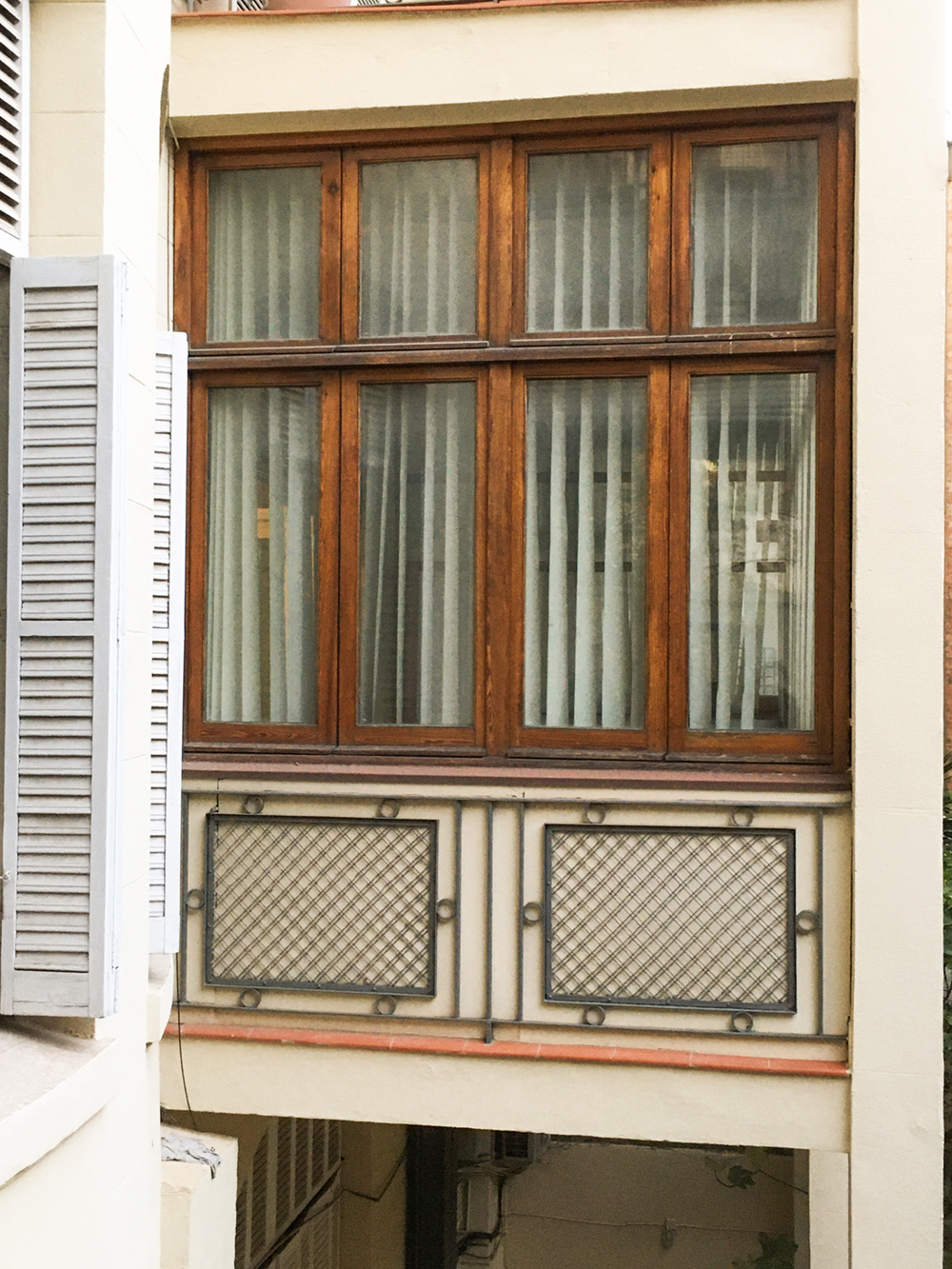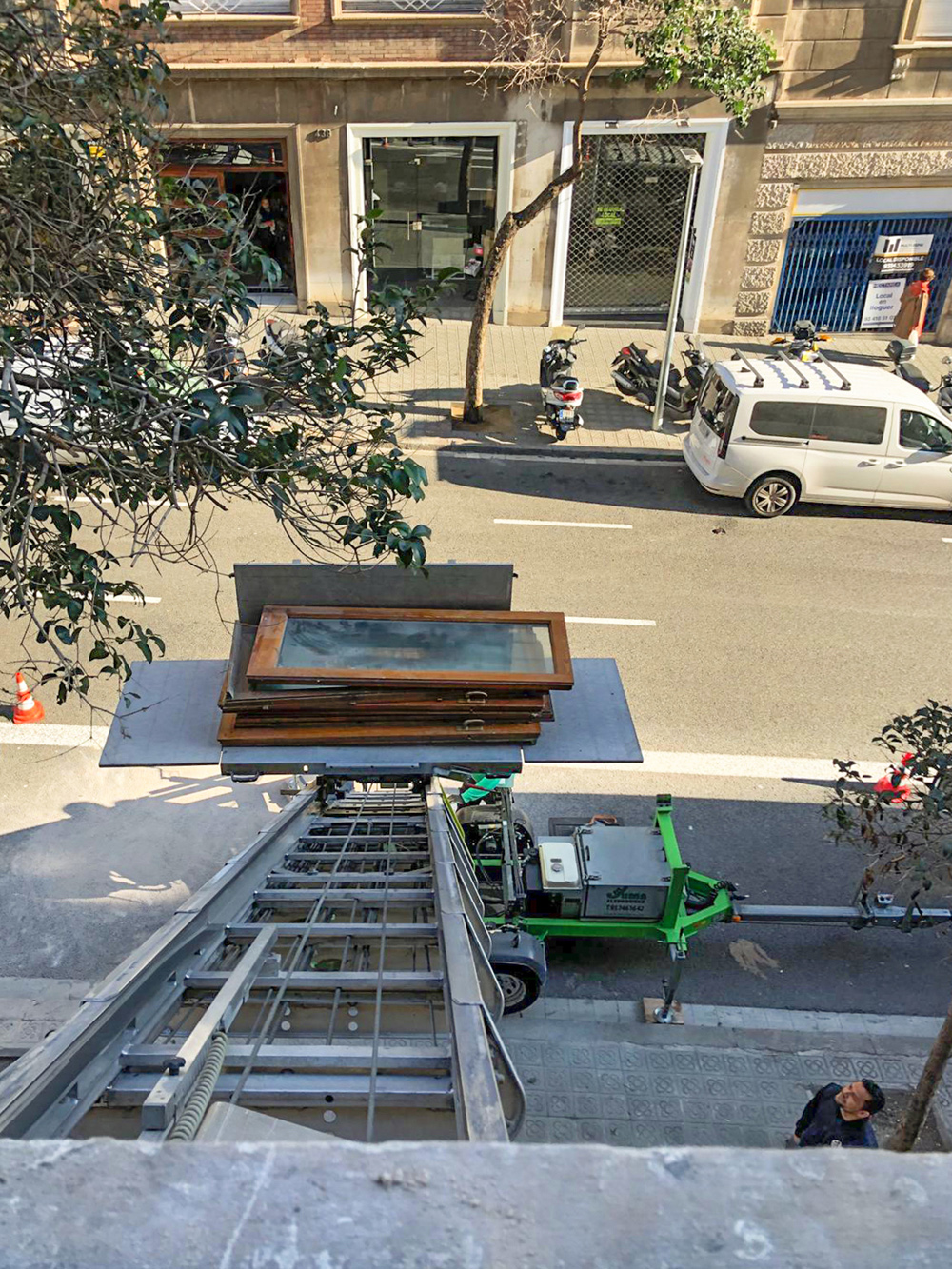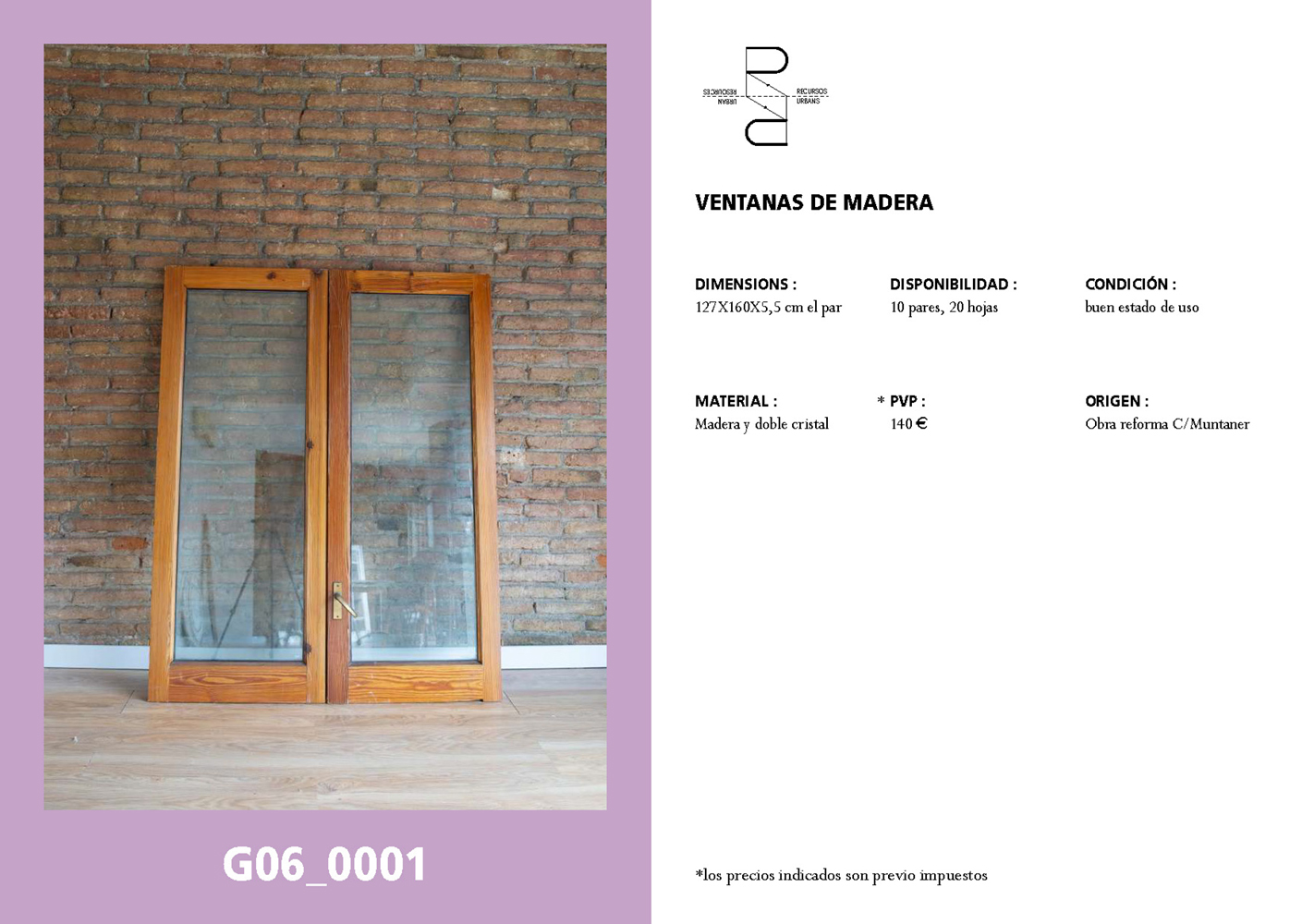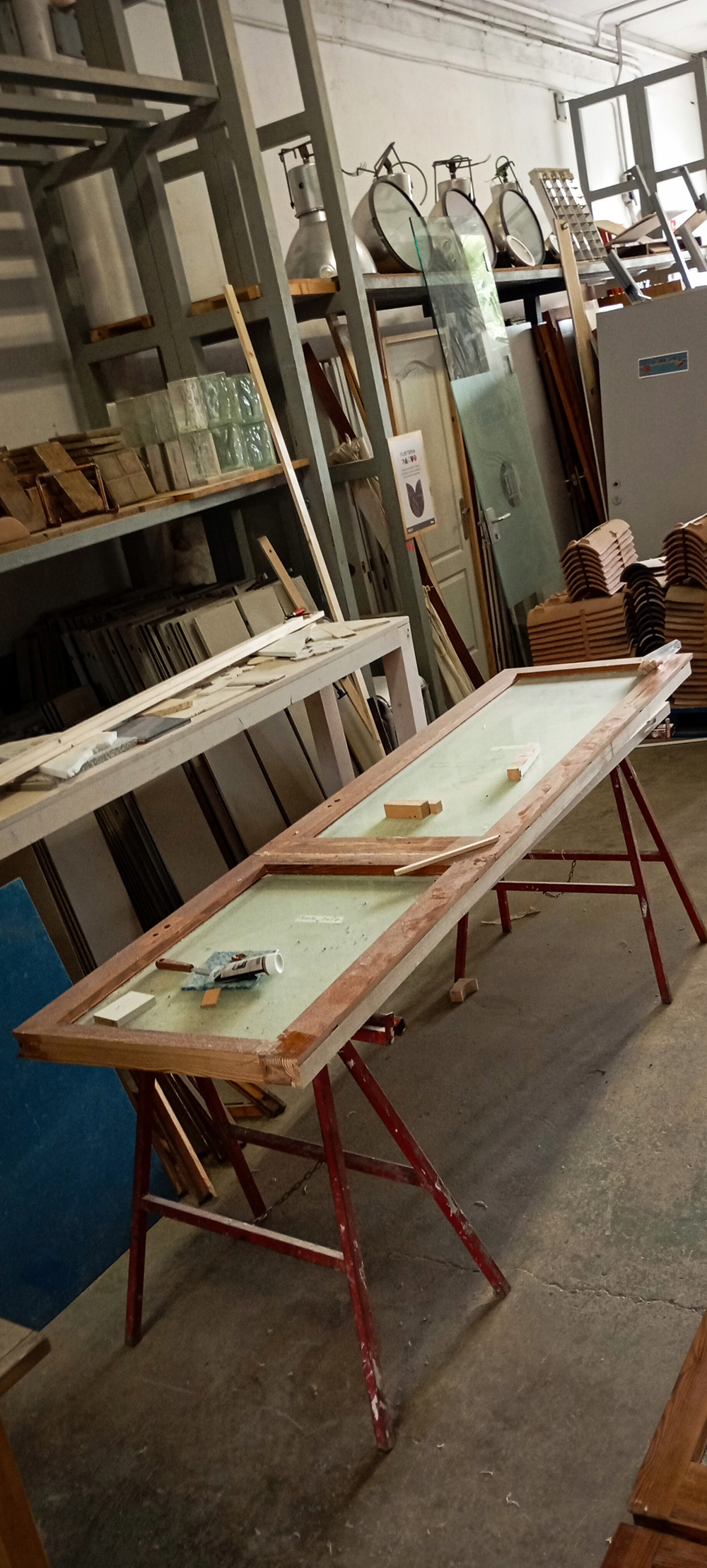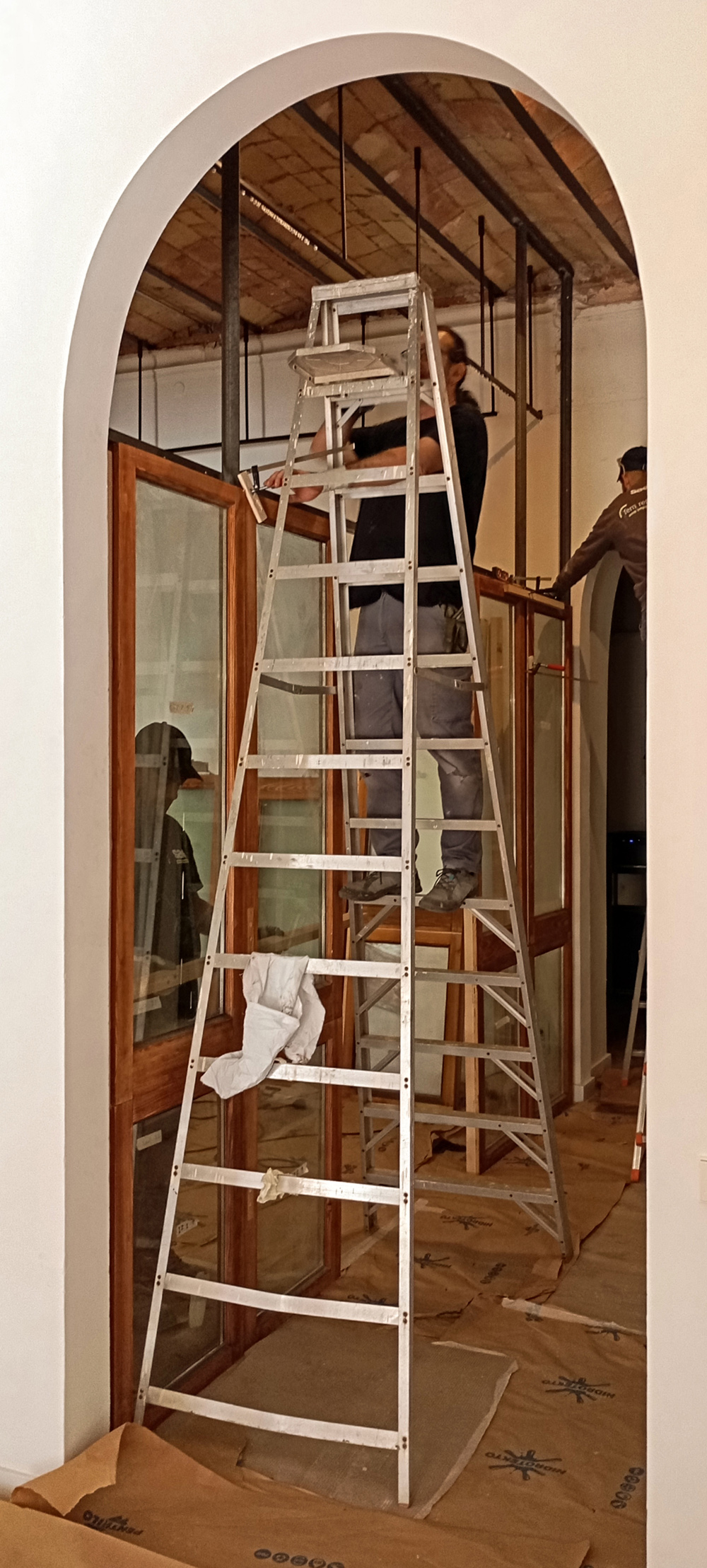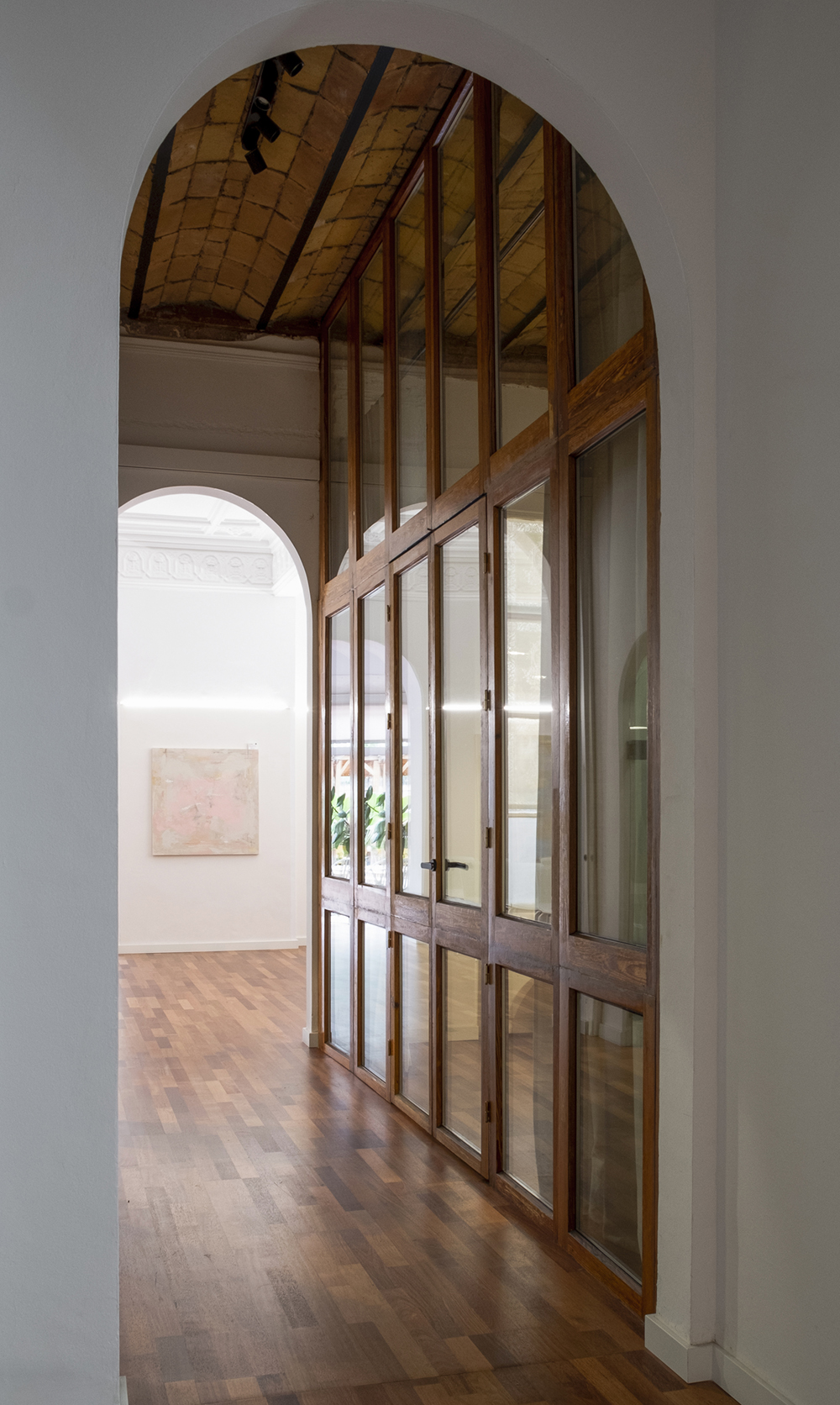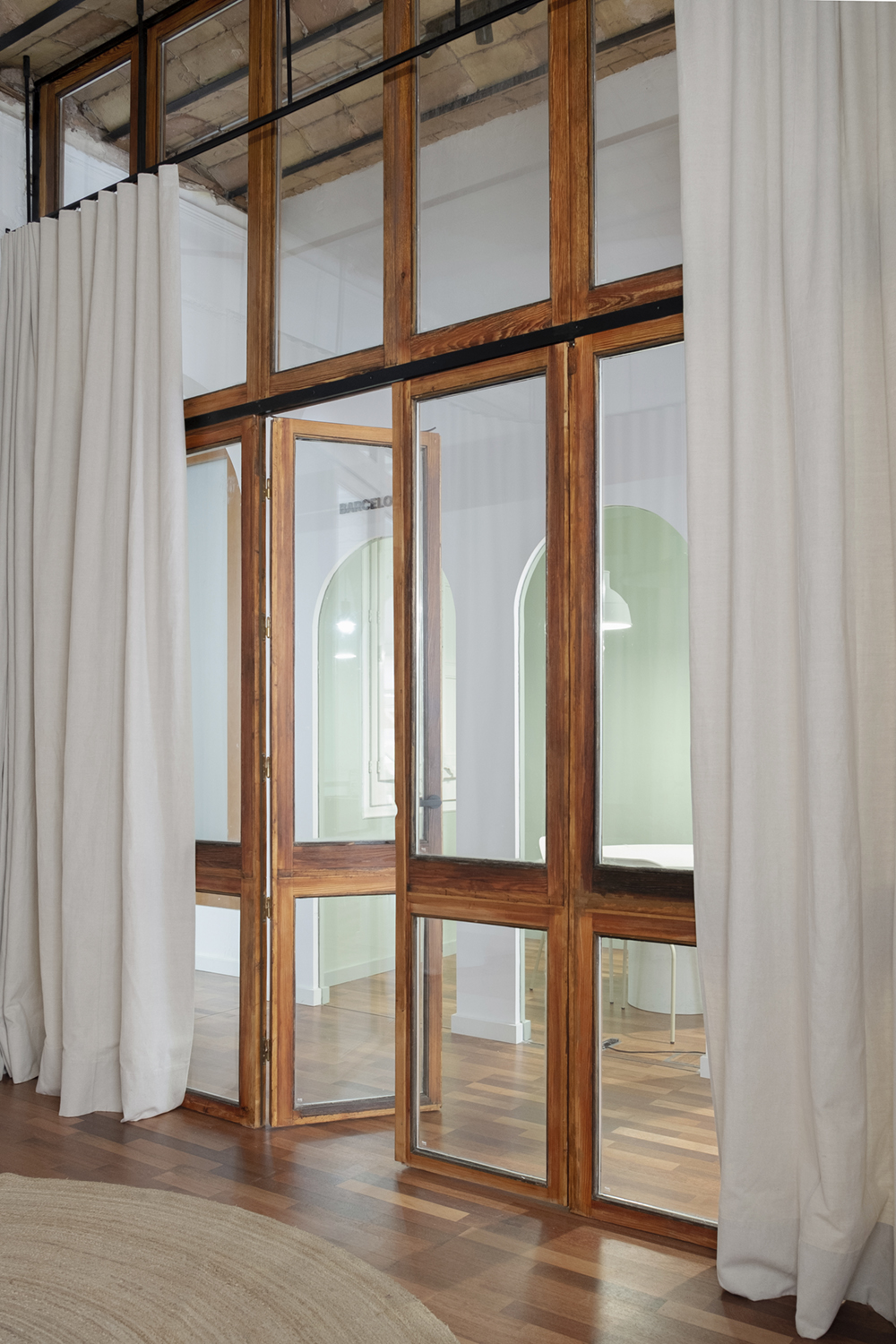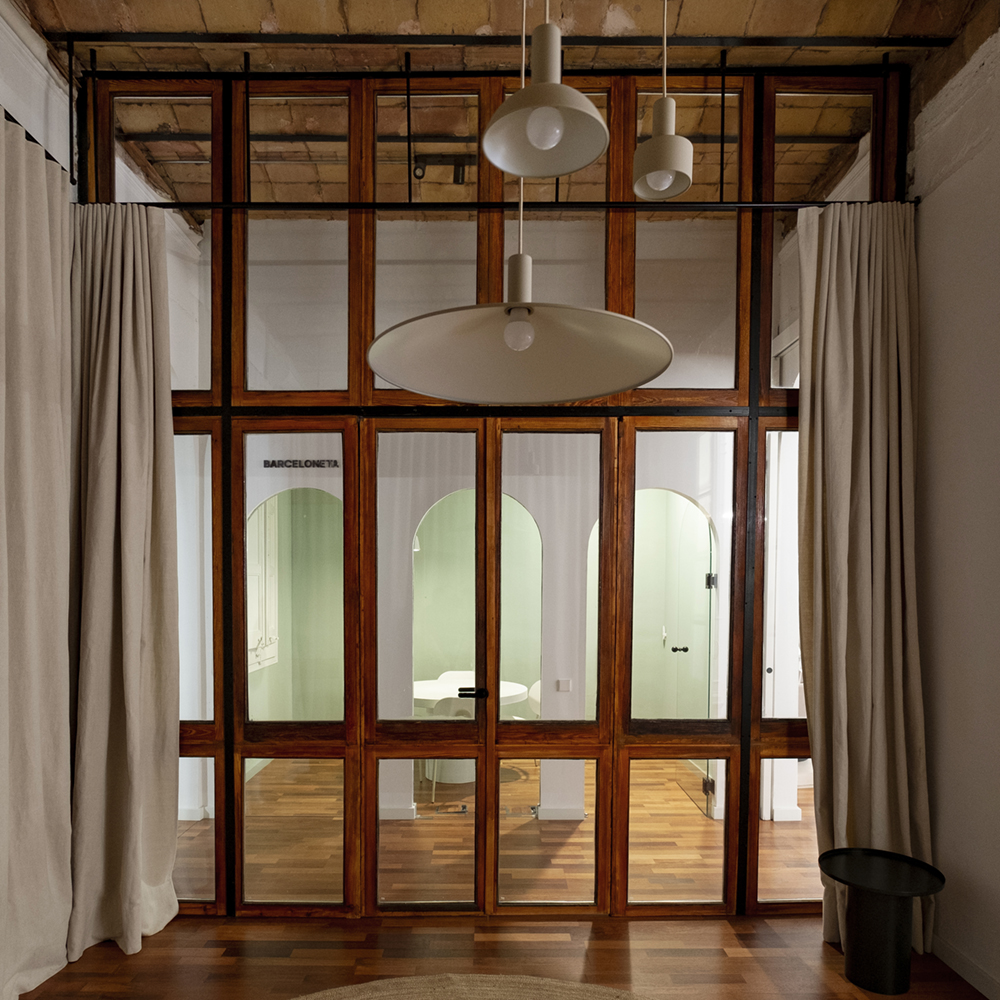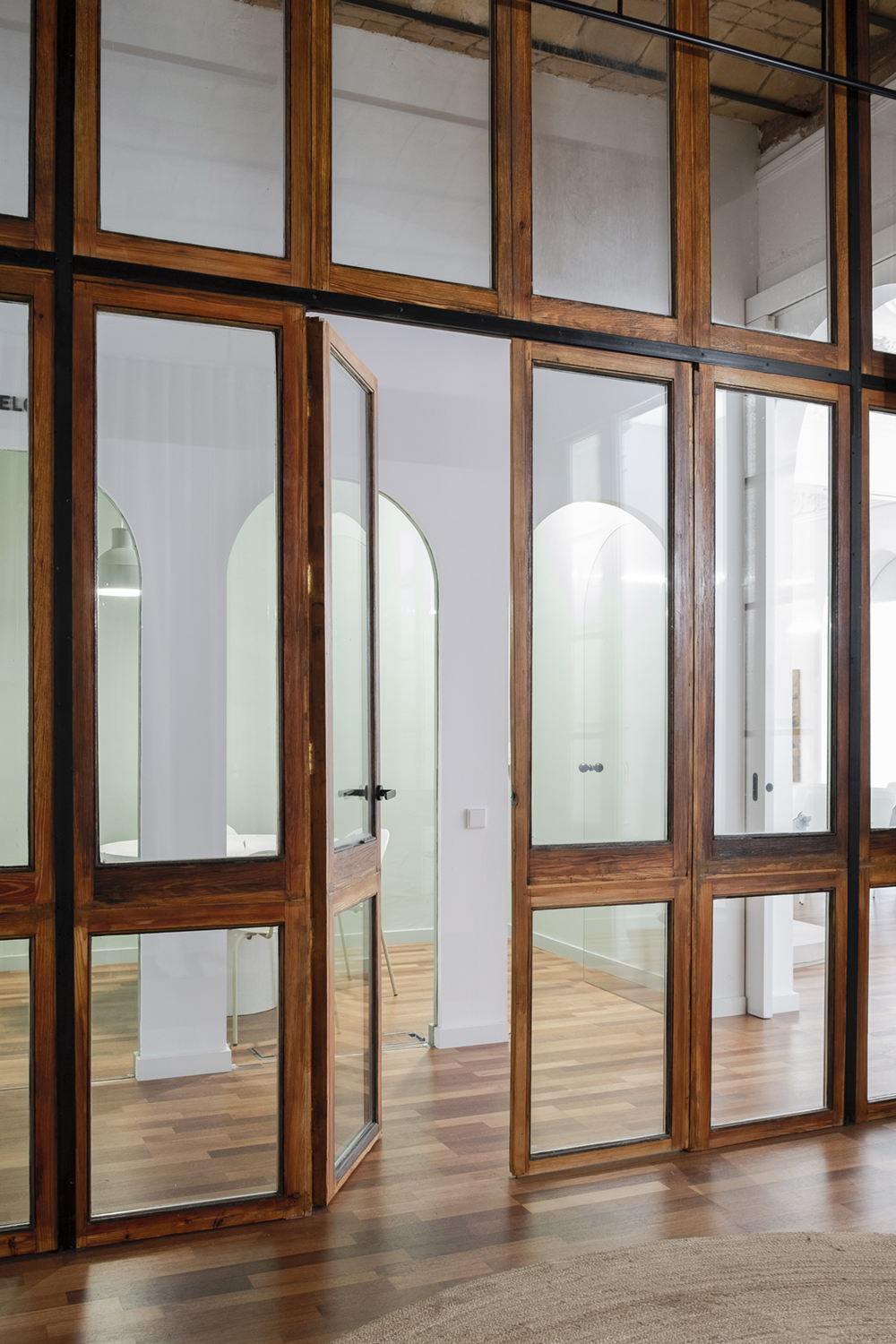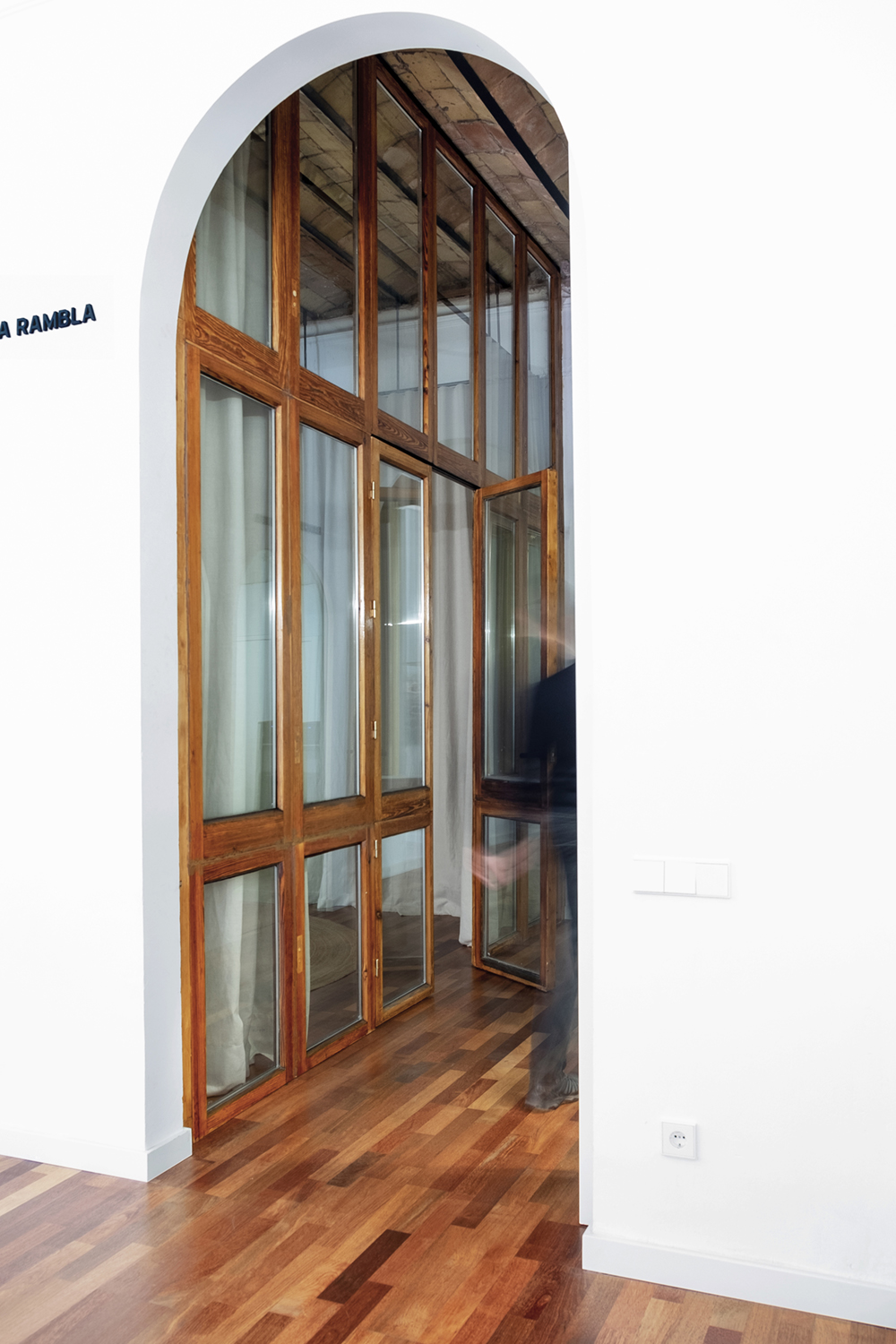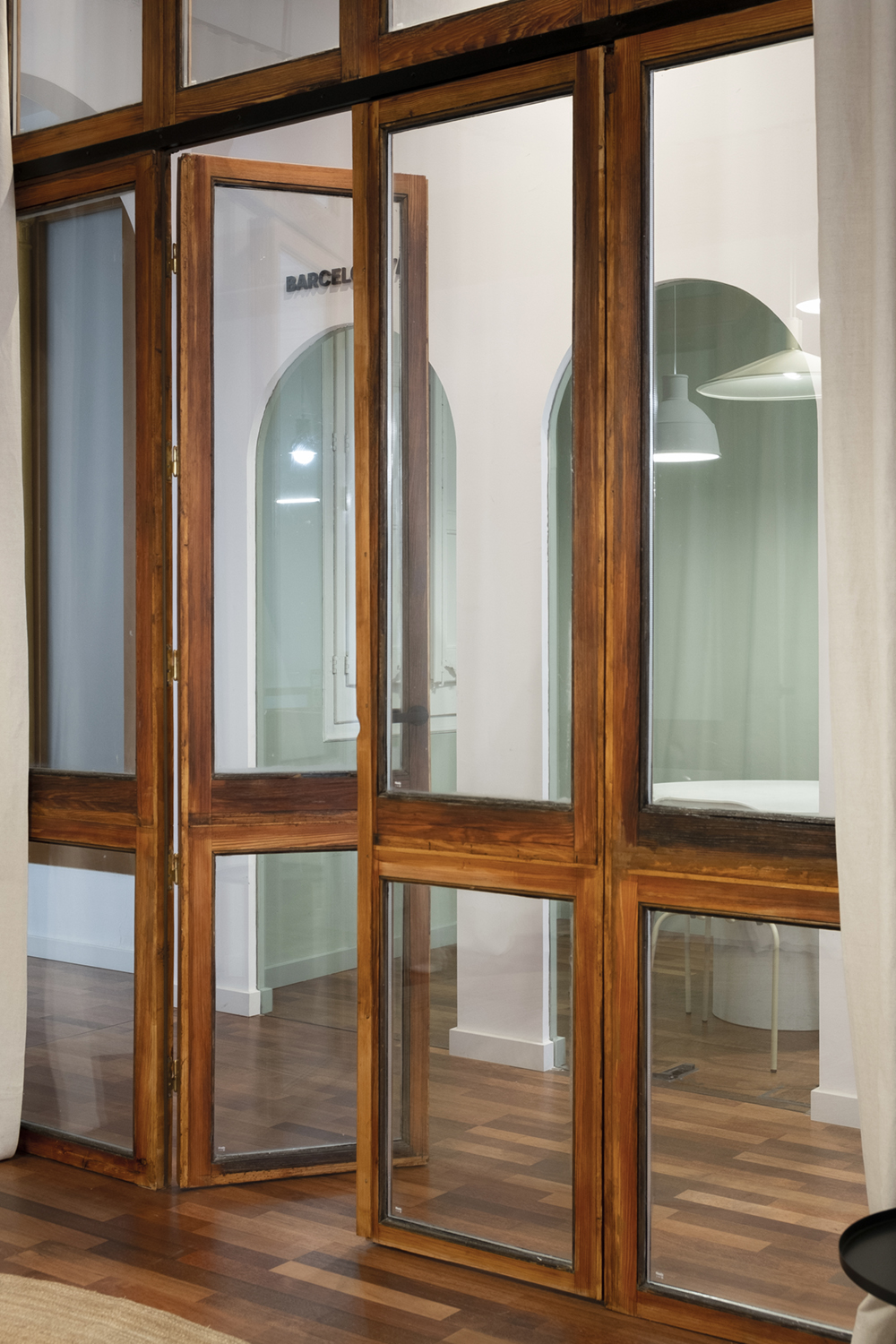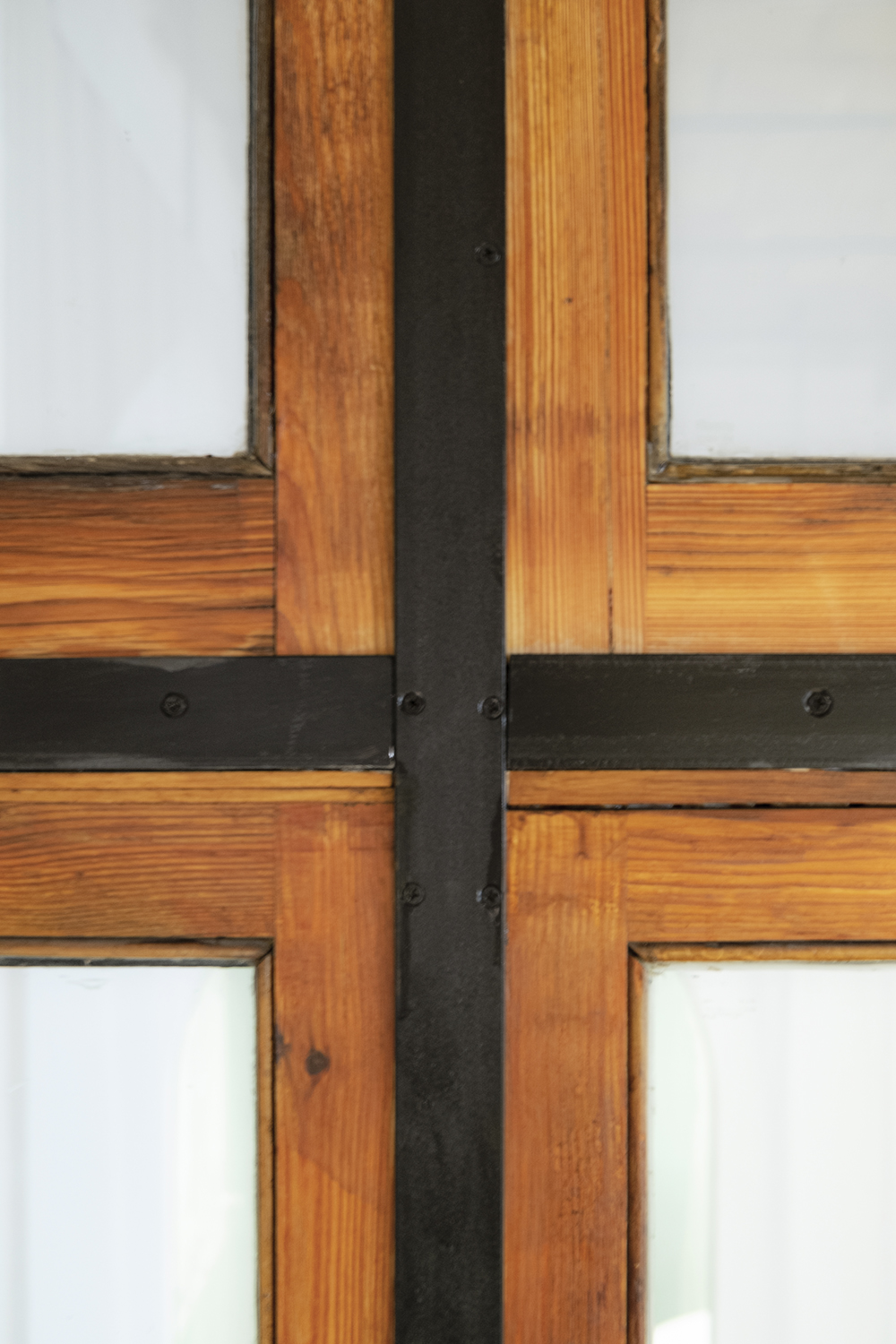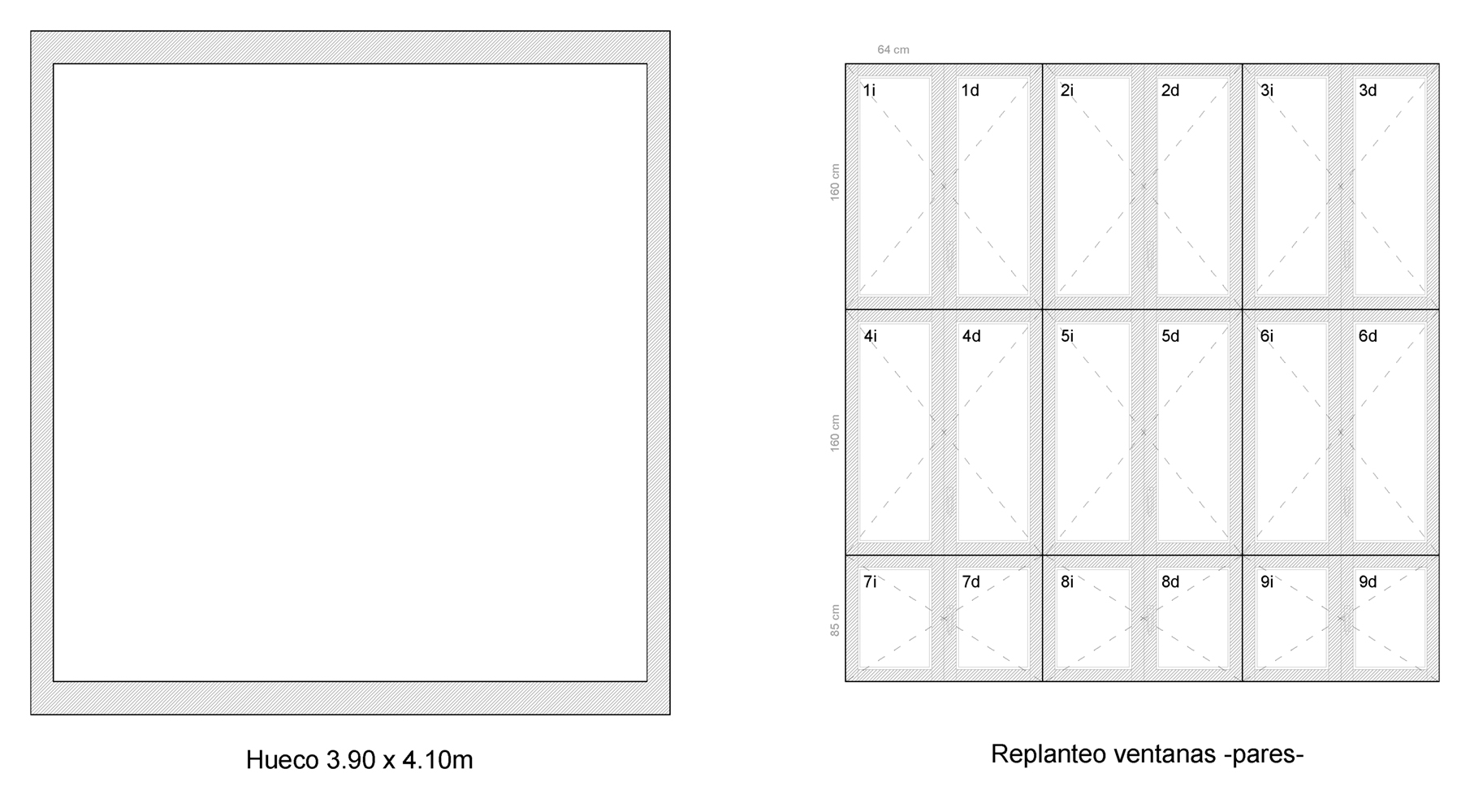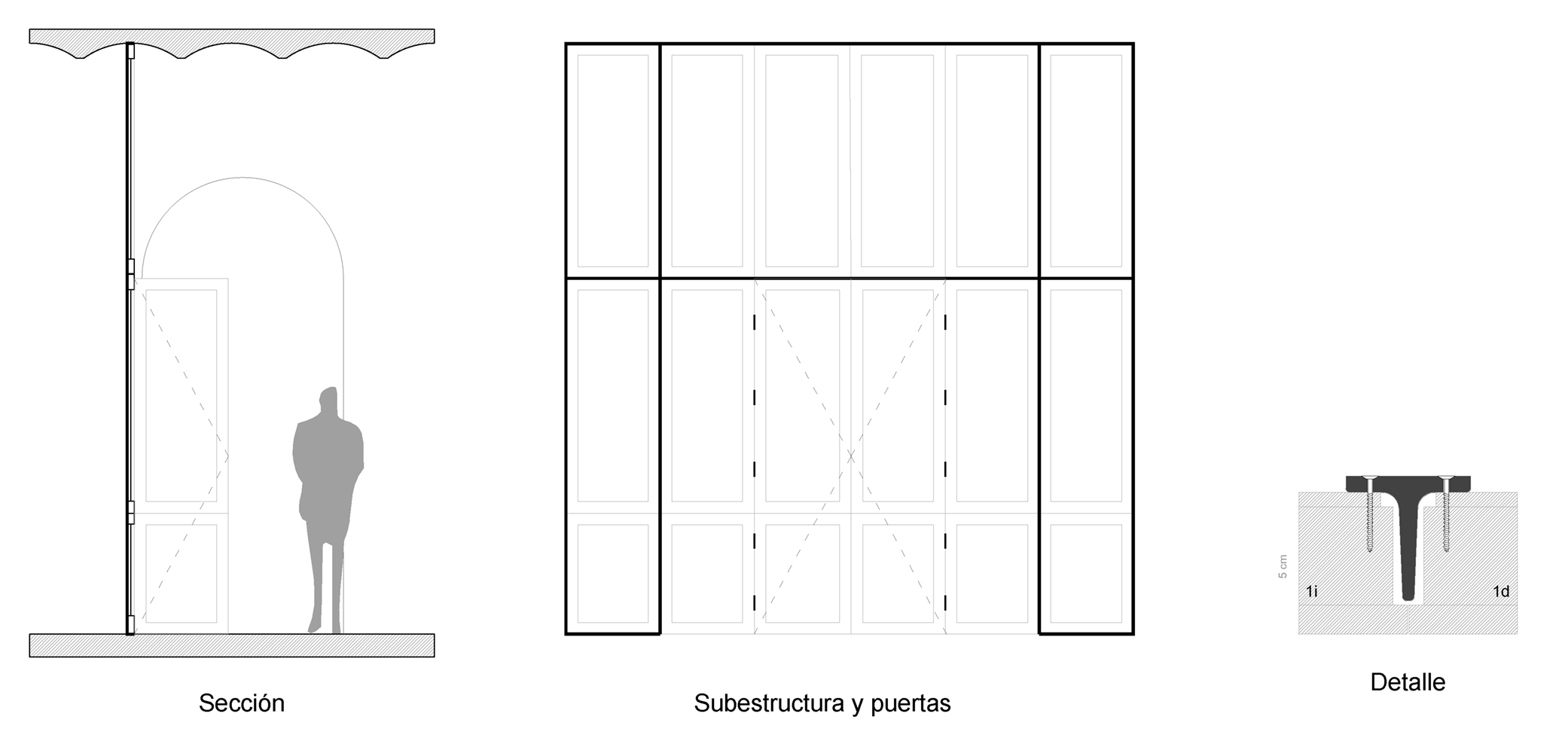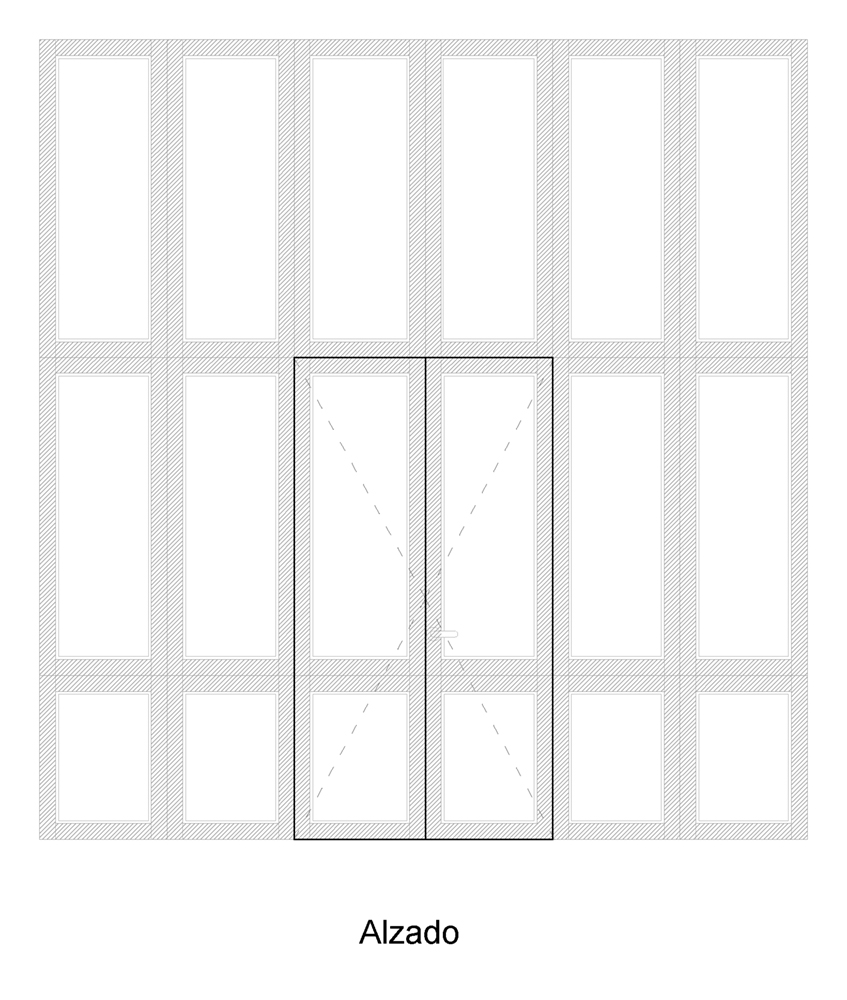Shaping a circular industrial ecosystem and supporting life-cycle thinking
22 Km
Office divider reusing locally rescued windows. Local resources for the common good
The redesign of 18 windows was a non-hierarchical process. The staff with an inclusion contract and the architect participate in both design decisions and workshop work. Solid wood and double-glazed windows are combined with a metal substructure, forming 2 doors in its central part. The process of disassembly, transfer, prefabrication and assembly on site is very efficient. In total 22 km were traveled. Reuse avoids waste, new extractions, energy and GHG. Create jobs, community and resilience
Spain
Regional
Barcelona Metropolitan Area
Mainly urban
It refers to a physical transformation of the built environment (hard investment)
Yes
2024-11-15
No
No
No
As an individual
"22km" is an innovative urban mining and adaptive design project that focuses on the sustainable reuse of materials, aiming to tackle pressing environmental, social, and economic challenges. The project repurposes 18 wooden windows, which were salvaged from a demolition site just 3 kilometers away, and transforms them into the closure for an office space. The primary objective is to extend the life cycle of these materials, contributing to sustainability by reducing waste and the need for new raw materials.
The target groups for this project include the local community, people in vulnerable social situations, and the wider public who benefit from a more sustainable approach to architecture. By utilizing materials close to their origin, the project minimizes transportation impact and supports local economies. It also provides opportunities for social inclusion, as the process involves individuals in vulnerable positions through collaboration with a social enterprise.
Key outcomes of the project include the repurposing of materials for a new functional use, the generation of local employment, and the creation of a model that promotes both environmental sustainability and social inclusion. Additionally, the project fosters a circular economy by reducing material waste and energy consumption, which are crucial in addressing climate change. By focusing on proximity in both material sourcing and labor, the project exemplifies the principles of sustainable development and circularity.
The target groups for this project include the local community, people in vulnerable social situations, and the wider public who benefit from a more sustainable approach to architecture. By utilizing materials close to their origin, the project minimizes transportation impact and supports local economies. It also provides opportunities for social inclusion, as the process involves individuals in vulnerable positions through collaboration with a social enterprise.
Key outcomes of the project include the repurposing of materials for a new functional use, the generation of local employment, and the creation of a model that promotes both environmental sustainability and social inclusion. Additionally, the project fosters a circular economy by reducing material waste and energy consumption, which are crucial in addressing climate change. By focusing on proximity in both material sourcing and labor, the project exemplifies the principles of sustainable development and circularity.
Social inclusion and wealth redistribution
Form follows availability. Humiliation and acceptance.
Reusing chain and community regeneration
Non-hierarchical and transdisciplinary redesign processes
Materials as a systems. Km 0 circularity and reindustrialization
The project "22km" prioritizes sustainability by focusing on the reuse of materials, specifically 18 solid wood and double-glass windows, salvaged from a demolition site within 3 kilometers of the installation location. The key objective is to minimize waste by repurposing materials instead of contributing to the cycle of planned obsolescence. This approach is inherently sustainable because it avoids new material extraction and reduces the carbon footprint typically associated with manufacturing and transportation.
The project exemplifies sustainability through its effective circularity model: materials are recovered, transported, stored, and repurposed locally, drastically cutting down energy consumption and greenhouse gas emissions. Additionally, by creating local job opportunities in the areas of deconstruction, transportation, and fabrication, it fosters a resilient local economy. The project encourages a shift away from traditional production processes, demonstrating a scalable and sustainable approach for urban regeneration. This model proves that designing with what is already available can be both an environmentally and socially beneficial strategy, making it an exemplary case for the future of sustainable design.
The project exemplifies sustainability through its effective circularity model: materials are recovered, transported, stored, and repurposed locally, drastically cutting down energy consumption and greenhouse gas emissions. Additionally, by creating local job opportunities in the areas of deconstruction, transportation, and fabrication, it fosters a resilient local economy. The project encourages a shift away from traditional production processes, demonstrating a scalable and sustainable approach for urban regeneration. This model proves that designing with what is already available can be both an environmentally and socially beneficial strategy, making it an exemplary case for the future of sustainable design.
"22km" emphasizes the aesthetic value of reused materials while enhancing the quality of experience for its users. The 18 windows, which were salvaged from a nearby demolition, retain their original charm and high-quality craftsmanship, embodying a sense of history and local character. The careful combination of the wooden frames and the addition of a minimal metal substructure creates a harmonious design that integrates modern needs with a rich, cultural legacy. The design solution is not only functional but also visually striking, offering a new life to materials that would otherwise have been discarded.
The use of local, repurposed materials helps create a unique and meaningful architectural experience for those interacting with the space. By highlighting the beauty and craftsmanship inherent in reclaimed materials, the project fosters a sense of connection between people, place, and history. This design approach demonstrates that sustainability can coexist with high aesthetic standards, proving that adaptive reuse can provide cultural benefits while offering a high-quality experience for the user.
The use of local, repurposed materials helps create a unique and meaningful architectural experience for those interacting with the space. By highlighting the beauty and craftsmanship inherent in reclaimed materials, the project fosters a sense of connection between people, place, and history. This design approach demonstrates that sustainability can coexist with high aesthetic standards, proving that adaptive reuse can provide cultural benefits while offering a high-quality experience for the user.
The project "22km" is rooted in the principle of inclusion, as it involves vulnerable groups in every step of the process, from the deconstruction of materials to their eventual installation. The windows were salvaged by Saó Prat, a social enterprise that specializes in employing people in vulnerable situations, ensuring that the benefits of the project are shared across the community.
The project fosters an inclusive approach by offering employment opportunities in skilled trades, which are typically less accessible to marginalized groups. Through collaboration with local workers, the project helps to create pathways to social integration and economic stability. The design itself, focused on repurposing materials locally, ensures that the project is not only accessible in terms of workforce inclusion but also contributes to affordability and equitable economic opportunities. By promoting social inclusion through collaborative design and craftsmanship, "22km" serves as an example of how inclusive practices can drive both social and environmental change.
The project fosters an inclusive approach by offering employment opportunities in skilled trades, which are typically less accessible to marginalized groups. Through collaboration with local workers, the project helps to create pathways to social integration and economic stability. The design itself, focused on repurposing materials locally, ensures that the project is not only accessible in terms of workforce inclusion but also contributes to affordability and equitable economic opportunities. By promoting social inclusion through collaborative design and craftsmanship, "22km" serves as an example of how inclusive practices can drive both social and environmental change.
The project "22km" actively involved citizens and civil society, especially through its collaboration with Saó Prat, a local social enterprise. People from vulnerable backgrounds were directly involved in the deconstruction, transportation, and prefabrication processes, providing them with employment opportunities and a sense of purpose. This hands-on involvement enabled the workers to directly contribute to the final product, fostering pride and ownership in the project.
Additionally, the local community benefited from the project by gaining insight into sustainable practices, promoting a broader cultural shift towards reusing materials. Through this collaborative approach, the project has sparked discussions on sustainable design and community-based solutions to environmental challenges. The inclusion of citizens in the process created an empowering environment, showing how active participation in design and implementation can create lasting social change.
Additionally, the local community benefited from the project by gaining insight into sustainable practices, promoting a broader cultural shift towards reusing materials. Through this collaborative approach, the project has sparked discussions on sustainable design and community-based solutions to environmental challenges. The inclusion of citizens in the process created an empowering environment, showing how active participation in design and implementation can create lasting social change.
Stakeholders at multiple levels were engaged in the design and implementation of "22km", with a particular focus on local and regional involvement. At the local level, the collaboration with Saó Prat and Recursos Urbans played a key role in the project's success, particularly in the deconstruction, transportation, and storage of the windows. Saó Prat, a social enterprise, provided job opportunities for people in vulnerable situations, contributing to the social dimension of the project.
On a regional scale, the project benefited from the expertise of local artisans and tradespeople, who were integral to the prefabrication process. Their involvement ensured that the project was executed efficiently and with high-quality craftsmanship. At the European level, the project promotes the idea of local, sustainable design practices as a viable alternative to traditional global production methods. The engagement of these stakeholders added immense value by creating a collaborative ecosystem that ensured the project met its sustainability, social, and economic objectives while contributing to the European discourse on circular design and local economies.
On a regional scale, the project benefited from the expertise of local artisans and tradespeople, who were integral to the prefabrication process. Their involvement ensured that the project was executed efficiently and with high-quality craftsmanship. At the European level, the project promotes the idea of local, sustainable design practices as a viable alternative to traditional global production methods. The engagement of these stakeholders added immense value by creating a collaborative ecosystem that ensured the project met its sustainability, social, and economic objectives while contributing to the European discourse on circular design and local economies.
The project "22km" brings together a diverse range of disciplines, including architecture, social enterprise, urban mining, and craftsmanship. The architect's role was to design a functional and aesthetically appealing solution for repurposing the windows, while the social enterprise contributed its expertise in inclusive employment practices, ensuring that marginalized groups were integrated into the process.
The collaboration between architects, social workers, and artisans created a multidisciplinary approach that allowed for the optimization of resources and processes. The dialogue between these fields enriched the project by fostering innovation in both the design and implementation phases, ensuring that sustainability, inclusion, and functionality were prioritized. The added value of this process is the integration of social and environmental goals, demonstrating how interdisciplinary cooperation can result in more effective and meaningful outcomes.
The collaboration between architects, social workers, and artisans created a multidisciplinary approach that allowed for the optimization of resources and processes. The dialogue between these fields enriched the project by fostering innovation in both the design and implementation phases, ensuring that sustainability, inclusion, and functionality were prioritized. The added value of this process is the integration of social and environmental goals, demonstrating how interdisciplinary cooperation can result in more effective and meaningful outcomes.
"22km" stands out for its innovative approach to urban mining and adaptive design. Unlike mainstream construction projects that rely on new materials and traditional processes, this project rethinks the concept of "waste" by salvaging and repurposing existing materials—specifically windows—from a nearby demolition site. The project challenges conventional design practices by using local, discarded materials in an efficient and circular manner, emphasizing the value of what already exists rather than contributing to the demand for new resources.
The project also integrates social inclusion into the design process, as people from vulnerable communities participate in the physical work of deconstruction, transportation, and fabrication. This holistic approach—combining environmental sustainability with social empowerment—sets the project apart from traditional construction and design initiatives, offering a more integrated and forward-thinking model for urban regeneration.
The project also integrates social inclusion into the design process, as people from vulnerable communities participate in the physical work of deconstruction, transportation, and fabrication. This holistic approach—combining environmental sustainability with social empowerment—sets the project apart from traditional construction and design initiatives, offering a more integrated and forward-thinking model for urban regeneration.
The methodology behind "22km" is based on the principles of urban mining, adaptive reuse, and circular economy. The project begins with the careful deconstruction of materials from a nearby demolition site, focusing on recovering usable elements, particularly the wooden windows. These materials are then transported to a local workshop where they are cleaned, stored, and repurposed for a new function.
The design process involves collaboration between the architect and workers from the social enterprise Saó Prat, with the staff actively participating in both the design and fabrication phases. The windows are adapted and integrated into a new structure with minimal intervention, allowing for future disassembly and reuse. This approach is not only efficient but also ensures that the materials retain their original value and craftsmanship, extending their lifecycle and minimizing environmental impact.
The design process involves collaboration between the architect and workers from the social enterprise Saó Prat, with the staff actively participating in both the design and fabrication phases. The windows are adapted and integrated into a new structure with minimal intervention, allowing for future disassembly and reuse. This approach is not only efficient but also ensures that the materials retain their original value and craftsmanship, extending their lifecycle and minimizing environmental impact.
The principles behind "22km" are highly transferable and can be applied to other cities, communities, and contexts. The methodology of salvaging local materials and repurposing them for new uses can be replicated in various urban environments, particularly those with access to deconstruction sites and local craftsmanship.
The model of engaging social enterprises and vulnerable workers in the design and construction process is also replicable, offering opportunities for inclusive employment and skills training. Moreover, the project’s focus on local sourcing and circular economy principles can be adapted to a variety of scales, from small community projects to larger urban regeneration efforts.
Key learnings from the project, including the importance of collaboration, the value of working with existing materials, and the benefits of local production, are applicable globally. This makes "22km" a model for sustainable, socially inclusive design that can be adapted and scaled to meet the needs of different communities
The model of engaging social enterprises and vulnerable workers in the design and construction process is also replicable, offering opportunities for inclusive employment and skills training. Moreover, the project’s focus on local sourcing and circular economy principles can be adapted to a variety of scales, from small community projects to larger urban regeneration efforts.
Key learnings from the project, including the importance of collaboration, the value of working with existing materials, and the benefits of local production, are applicable globally. This makes "22km" a model for sustainable, socially inclusive design that can be adapted and scaled to meet the needs of different communities
"22km" addresses several global challenges by providing local solutions that are both sustainable and socially impactful. The project tackles the issues of waste, resource depletion, and climate change by reusing materials that would otherwise have been discarded. By focusing on local sourcing and minimizing transportation, the project reduces carbon emissions associated with the construction industry.
The project also contributes to social inclusion by providing vulnerable groups with employment opportunities in skilled trades, helping to reduce unemployment and inequality in the local community. Additionally, by fostering a circular economy, "22km" demonstrates how local solutions can mitigate global challenges, such as the environmental impact of construction and the social fragmentation caused by economic exclusion.
The project also contributes to social inclusion by providing vulnerable groups with employment opportunities in skilled trades, helping to reduce unemployment and inequality in the local community. Additionally, by fostering a circular economy, "22km" demonstrates how local solutions can mitigate global challenges, such as the environmental impact of construction and the social fragmentation caused by economic exclusion.
The outcomes of "22km" are multifaceted, impacting both the environment and the local community. The project successfully repurposed 18 windows that would have otherwise contributed to waste, demonstrating the potential of urban mining and adaptive reuse. This not only reduced material waste but also prevented the need for new raw materials, helping to conserve natural resources.
The project also created local employment opportunities, particularly for individuals from vulnerable backgrounds, providing them with valuable skills and experience. Through collaboration with Saó Prat, the project contributed to social inclusion, empowering participants to take part in meaningful work and improving their prospects for future employment.
Indirect beneficiaries include the local community, which now has a physical example of sustainable design and circular economy practices. The project has sparked a wider conversation about sustainability and has the potential to inspire similar initiatives in other areas, further promoting the values of reuse, social inclusion, and environmental responsibility.
The project also created local employment opportunities, particularly for individuals from vulnerable backgrounds, providing them with valuable skills and experience. Through collaboration with Saó Prat, the project contributed to social inclusion, empowering participants to take part in meaningful work and improving their prospects for future employment.
Indirect beneficiaries include the local community, which now has a physical example of sustainable design and circular economy practices. The project has sparked a wider conversation about sustainability and has the potential to inspire similar initiatives in other areas, further promoting the values of reuse, social inclusion, and environmental responsibility.

